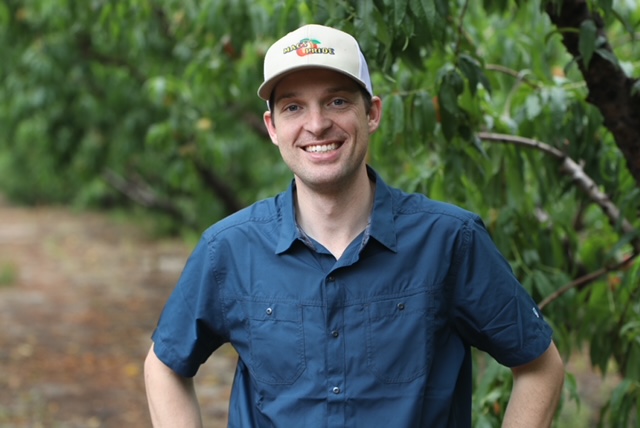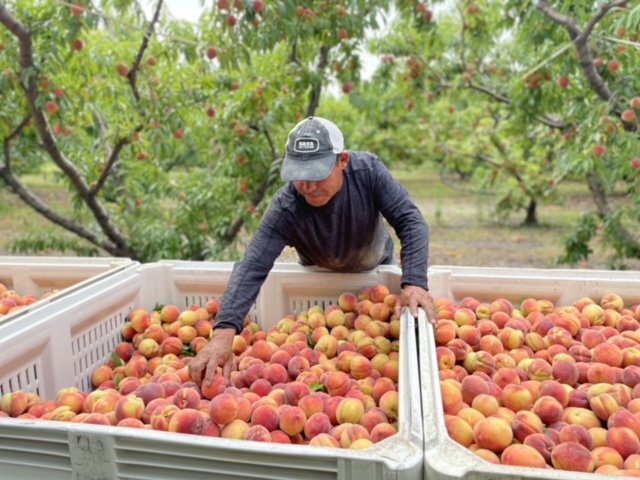
By Clint Thompson
Spencer McLeod did not set out to be one of the largest peach producers in the Southeast. It just happened that way.
“I don’t necessarily want to be the biggest grower and I don’t want to be the smallest grower, but I want to be the best grower,” McLeod said.
Producing a Plethora of Peaches
McLeod has found success with his farming operation in McBee, South Carolina, located in the north-central part of the state. McLeod Farms produces fresh peaches beginning May 20 through Sept. 10, spanning almost four months. The operation grows 50 different varieties of peaches. Each possesses a different quality that allows the farm the opportunity to offer fresh peaches all summer.

“The varieties only ripen over a two-week period. The varieties I pick first, I’ll pick that for two weeks and then it’s done. We’ve got 50 varieties that overlap and take us through the summer to give us a good supply for our customers,” McLeod explained.
Different characteristics make up a peach variety’s attractiveness as an option to grow, such as skin color and clingstone versus freestone. But perhaps the most impactful trait is ripening time. Scheduling when peaches are ready for harvest allows McLeod to plan his entire harvest window for the summer.
“Sure, there’s some varieties early in the season that may have some qualities that I don’t particularly care for, but it gives me something to pick,” McLeod said. “We also try to pick varieties based not just on the ripening time but also what fits well for our area. When you go to Georgia or to North Carolina, to Michigan or to California, you’ll find lots of different varieties that may be successful in some regions but aren’t quite as successful in others. There are some varieties that Georgia grows that I just don’t do well with. They eat good and they’re great peaches, they just don’t work for my climate.”
McLeod has been successful with his production strategy so far. McLeod Farms grows approximately 1,000 acres of peaches every year. Some of the main varieties include June Prince, Winblo, July Prince, Cresthaven, Sun Prince, Flame Prince, O’Henry, Big Red and Cary Mac, which is a mutation of the Loring peach that was discovered on the farm. It was named after McLeod’s father, Cary McLeod.
Spencer likes his current acreage, though he is not opposed to continuing to expand. But he wants to expand “intelligently.”
“I want to try to deliver high-quality peaches. We have a really great climate and soil types that allow us to grow really good eating peaches. We have something special here in South Carolina that is unique to the Southeast, especially with those varieties,” McLeod said.
Putting Technology to Work
Smart planning has provided McLeod an advantage in producing his peach crop. So, too, has intelligent investments, specifically in technology.
McLeod Farms invested in wind machines in the late 80s to early 90s as a way to protect the crop during spring freeze events that are common in South Carolina. McLeod said he utilizes almost 60 today, and they were put to work last year. While much of the crop in the Southeast was devastated because of freeze events in March 2023, McLeod’s location dodged much of the frigid temperatures. What the farm did experience was thwarted by the wind machines that were in place.
Wind machines are just one example of how McLeod Farms uses technology to operate more efficiently.
“Technology is great in agriculture, and we need to be proactive in adopting new technology, but again we have to be intelligent in what we’re going to adopt and having something that really provides value to us,” said McLeod. “About three years ago, we installed a new sorter that uses camera technology and vision systems that allow us to grade our peaches. We’re always trying to find technology to help reduce costs and labor.”
Lobbying for Labor Reform
McLeod Farms is not immune to the labor crisis that is gripping the entire agricultural sector. Domestic labor is in short supply. The H-2A program is cumbersome and extremely expensive. McLeod continues to speak out for labor reform, even when the response is not what he wants to hear.
“We spend a lot of time and effort in lobbying for labor law changes and help in our migrant worker programs to make them easier. It seems like each year, our efforts in making that easy are for naught,” McLeod said. “It seems like it gets more difficult every year.”
Automated harvesters are gaining traction with certain commodities in the specialty crop sector. However, their presence in the peach industry may be more of a dream than a reality.
“The difficult thing about picking peaches is we’re going to go over that two-week period when those trees are getting ripe, so we’re going to pick them every other day. You’re leaving peaches behind. You’re picking what’s ripe,” McLeod said. “It’s not as simple as putting peaches in a bag. You’re making some choices out there, and you’ve got to be knowledgeable about the variety. If you pick a Scarlet Prince based on color, you’d never pick a Summer Gold because it’s never going to have the color that Scarlet Prince is going to have. There’s a lot of moving parts with how you would teach a robot to pick the peaches.”
Embracing Diversity
For farming operations to flourish and remain sustainable, they need to diversify what they grow. Growers can no longer put all of their eggs in one basket with respect to farming one specific crop.
McLeod Farms produces strawberries and blackberries, as well as various vegetables like tomatoes, zucchini, potatoes, okra, melons and peas. The crop diversity is designed to provide insurance against the potential of an ‘off’ year for a crop or if a crop suffers damage from a natural disaster.
“I’d say we’re one of the most diverse farms in the Southeast,” McLeod said. “Outside of those specialty crops, we also grow row crops. We grow cotton, peanuts, corn and soybeans. We also grow some seed crops. That diversity is our insurance.
“I’d rather have a diverse set of crops than pay out insurance premiums. Because we’re diverse, we can also take things we learn in one crop and apply it to another, whether it’s in spraying, cultivation or nutrient management. That just sharpens our blade in general as farmers — understanding crop failures or lessons learned in the everyday grind of growing food.”
McLeod also embraces diversity in the way he sells his produce, which includes retail, chain stores, mail order and direct-to-consumer. The farm has established a roadside market because it is conveniently situated on the way to the beach for those traveling from Charlotte, North Carolina.
“We’re really diverse, not only in our crops but also in the way they are marketed,” he said. “Those markets were developed out of opportunity. We saw them as ways to diversify our revenue stream. Being in a lot of those different channels gives you the opportunity down the road that you might not see today.”









